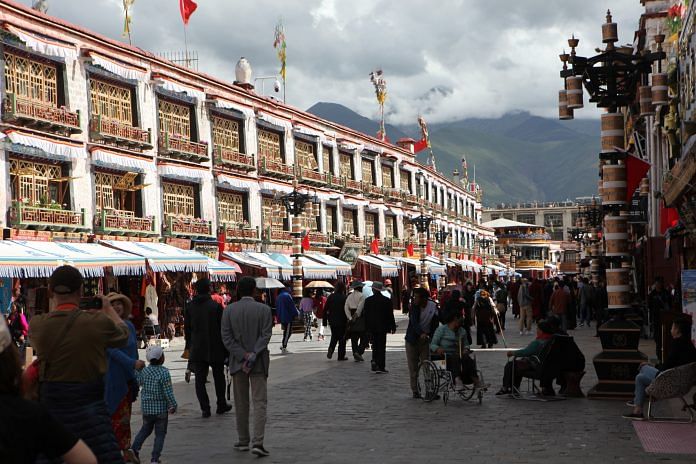Beijing: Chinese President Xi Jinping has called for building a “new modern socialist” Tibet, constructing an “impregnable wall” against separatism in the sensitive Himalayan region and “sinicisation” of the Tibetan Buddhism, the official media reported on Saturday.
Xi, also the General Secretary of the ruling Communist Party of China (CPC), in his address to the seventh Central Symposium on Tibet Work, said that efforts must be made to build Tibet that is united, prosperous, culturally advanced, harmonious and beautiful, Xinhua news agency reported.
Underlining the need to fully implement the CPC’s policies on governing Tibet for a new era, Xi, in a comprehensive address on the Himalayan region, called for efforts to build a new modern socialist Tibet.
He told officials attending the two-day symposium that they should make efforts to “ensure national security and enduring peace and stability, steadily improve people’s lives, maintain a good environment, solidify border defence and ensure frontier security,” the report said.
Tibet, officially referred to as the Tibet Autonomous Region (TAR), remained deeply devoted to Buddhism where the Dalai Lama is revered as the spiritual head despite his self-exile to India since 1959 after China took control of the region in 1950. It also shares borders with India, Bhutan and Nepal.
President Xi said that the work in Tibet must insist on maintaining the unity of the motherland and strengthening national unity as the focus.
It is necessary to strengthen the education and guidance of the masses, extensively mobilise the masses to participate in the struggle against separatism, and form an impregnable wall for maintaining stability, he said.
While Beijing views the Dalai Lama as a separatist and splittist who seeks to split Tibet from China, the 1989 Nobel Peace Prize laureate says he only seeks greater rights for Tibetans, including religious freedom and autonomy.
The 14th Dalai Lama fled to India in 1959 following a crackdown on an uprising by the local population in Tibet. India granted him political asylum and the Tibetan government-in-exile is based on Dharamsala in Himachal Pradesh since then.
Xi also spoke of sinicisation of the Tibetan Buddhism.
It is necessary to dig out, sort out and publicise the historical facts of the exchanges and integration of all ethnic groups in Tibet since ancient times, guide the people of all ethnic groups to see the direction and future of the nation, deeply realise that the Chinese nation is a community of destiny, and promote exchanges and integration of all ethnic groups, Xi said.
Also read: What PLA’s India specialist officer said in 1962 gives us a clue to how China thinks
Sinicisation broadly refers to bringing non-Chinese communities under the Chinese culture and political system being pursued by the CPC under the broad definition of socialism with Chinese characteristics.
Since 1959, Tibet has been witnessing periodic incidents of violence, unrest and protest against Beijing.
China asserts that Tibet has been its part since the 13th century and will remain so forever.
It is necessary to actively guide the Tibetan Buddhism to adapt to the socialist society and promote the sinicisation of the Tibetan Buddhism, Xi said.
He said that since the sixth symposium in 2015, Tibet has made comprehensive progress and historic achievements in its various undertakings.
He noted that Tibet has achieved sustained stability and rapid development, constituting a major contribution to the overall work of the CPC and the state.
Since the 18th CPC National Congress in 2012, when he took over power, policies on governing Tibet for a new era have taken shape, Xi said, stressing that the CPC leadership, the system of socialism with the Chinese characteristics and the system of regional ethnic autonomy must be upheld to carry out work related to Tibet.
Besides Xi, Premier Li Keqiang and other senior leaders of the CPC, official in-charge of the Tibet Autonomous Region, the party and government of various cities and provinces of Sichuan, Yunnan, Gansu and Qinghai provinces took part in the meeting which concluded here on Saturday.
Also read: China digs heels in for winter, continues building roads and bridges on own side of LAC




The Print provides a platform for Chinese propoganda.
This is alarming.
Another genocide in the offing for Tibetans.
Expansionism is one thing but killing of remaining Tibetans and culturally making it Chinese would stand next to holocaust, Kashmiri Hindu genocide and rawandan genocide.
And no one can do anything about.
There was no “genocide” of Kashmir Pandits. It is a propaganda.
How can you compare Tibet and Rwanda to what the Pandits went through. Around 500 pandits were killed in Kashmir. What happened to Pandits is wrong no doubt, but it was nowhere near the scale that the Tibetans went through.
For Tibetans the numbers were hundreds of thousands.